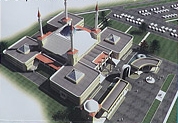"Podrobnosti", 30.10.2009
The administration of Simferopol suspended building of a mosque that could become one of the largest in Europe. City heads are Russians, and their decision caused indignation of the community of the Crimean Tatars, informs The New York Times.
Nowadays for the Crimean Tatars the place where it is supposed to build the mosque became a pilgrimage place. The Tatars urged to make the protest, delivering to the building site blocks from limestone, one of the leaders of the community, Refat Chubarov, informed. Thousand people responded to the appeal, and many carve on blocks names of their relatives once deported from Crimea by Stalin.
In 2004, the local administration approved the project of the mosque that can seat several thousands of people. Expenses on building - more than 10 million dollars – mainly were incurred by Turkish and other foreign sponsors, Chubarov said. However, in 2008 the mayoralty of Simferopol refused to definitely confirm the project, having referred that building is dangerous to environment (nearby is located the water basin). The mayoralty denies that the decision is accepted under the pressure of international or interreligious difference, and emphasized, that they offered other sites under the mosque.
From their part, leaders of the Tatars assure that local politicians simply do not want that in Simferopol there was a huge mosque. "Behind the scenes they say, "Crimea is Russian orthodox land. If you want to build a mosque, build it there, where nobody will notice it", Chubarov said.
Conditions are complicated by aspiration of Crimea to reunion with Russia, marks the edition. "All three parties struggle for the power on the peninsula, and the issue of the mosque became apple of discord", writes the edition.
The Tatar leaders assure that the building is hindered to kindle hatred to the Muslims and the Ukrainians on the eve of presidential election. When the president Yushchenko supported mosque building, the Russian-speaking Crimeans accused him of intervention in city affairs, the newspaper marks.



